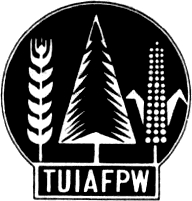
The World Federation of Trade Unions (WFTU) is an international federation of trade unions established in 1945. Founded in the immediate aftermath of World War Two, the organization built on the pre-war legacy of the International Federation of Trade Unions as a single structure for trade unions world-wide, following the World Trade Union Conference in London, United Kingdom.
The Unión General de Trabajadores is a major Spanish trade union, historically affiliated with the Spanish Socialist Workers' Party (PSOE).
A company or "yellow" union is a worker organization which is dominated or unduly influenced by an employer and is therefore not an independent trade union. Company unions are contrary to international labour law. They were outlawed in the United States by the 1935 National Labor Relations Act §8(a)(2), due to their use as agents for interference with independent unions. However, company unions persist in many countries.
Agrupación de Trabajadores Latinoamericanos Sindicalistas or ATLAS was a Latin American trade union confederation in the early 1950s.
Trade unionism is a powerful force in the politics, economy, and culture of Senegal, and was one of the earliest trades union movements to form in Francophone West Africa.

José Alonso was an Argentine politician and trade unionist.
Confédération générale du travail du Burkina is a revolutionary national trade union centre in Burkina Faso. Bassolma Bazié the general secretary of CGT-B.
Trade unions in Guinea were historically important - having played a pivotal role in the country's independence movement - and in recent years have again assumed a leading role.

The World Federation of Scientific Workers (WFSW) is an international federation of scientific associations. It is an NGO in official partnership with Unesco. Its goal is to be involved internationally in all aspects of the role of science, the rights and duties of scientists and their social responsibility. According to some opinions, it was a Cold War-era communist front. The group was said to be composed by a majority of scientists who supported communism, though it, was not explicitly an admission criterion in the direct sense. The federation opposed nuclear tests conducted by any states.

The World Federation of Teachers Unions is the Trade Union International (TUI) branch of the World Federation of Trade Unions representing educators.

The Trade Union International Public Service and Allied is a section of the World Federation of Trade Unions representing public sector workers.
The Trade Unions International of Building, Wood, Building Materials and Industries, also known as the Trade Unions International of Construction, Wood, Building Materials and Industries, or by its French acronym UITBB is a Trade Union International affiliated with the World Federation of Trade Unions.
The Trade Union International of Workers in Commerce was a trade union international affiliated with the World Federation of Trade Unions.
The Trade Union International of Workers in the Metal Industry was a trade union international affiliated to the World Federation of Trade Unions.

The Trade Union International of Agricultural, Forestry and Plantation Workers was a trade union international affiliated with the World Federation of Trade Unions.
The International Federation of Petroleum and Chemical Workers (IFPCW) was a global union federation bringing together trade union representing workers in the chemical and oil industries.
The World Federation of Energy, Chemical and Various Industry Workers' Unions was a global union federation bringing together unions representing workers in a variety of industries.
The National Federation of Construction Workers was a trade union representing workers in the construction industry in France.






